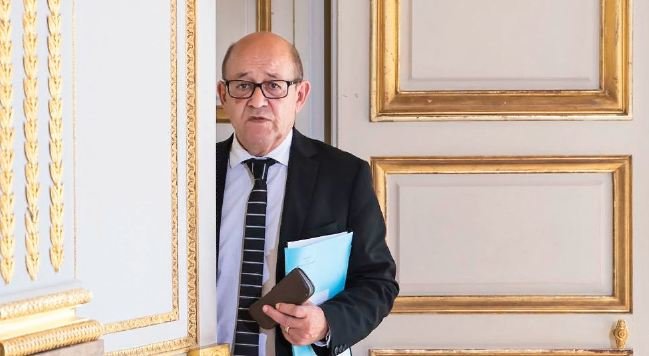France dangerous game over the Nuclear Deal

TEHRAN - On the eve of the negotiations between Iran and the members of the P4+1 in Vienna on the Joint Comprehensive Plan of Action (JCPOA), the French Foreign Minister determined the fate of "European JCPOA" once and for all! In an interview with RTL radio on the "Europe's package of proposals to Iran" for saving the nuclear deal, Jean Yves Le Drian stated:
"Iran must stop permanently threatening to break their commitments to the nuclear deal so that Europe can find the solutions so that Iran can have the necessary economic compensations.
France has also said that Europe would likely not be able to create an economic compensation package for Iran prior to November. Le Drian said France was working to create a plan to mitigate the effects of the United States' sanctions, which will be reapplied in August, and toughened in November.
"For the start August it seems a bit short, but we are trying to do it by November," he emphasized.
At the first glance, Le Drian's words seem to be simple and obvious. Some optimistic analysts may even agree with the French FM for more time being needed to come up with an economic compensation package. But the fact is that Le Drian is sending signals of entering a complicated and dangerous game! There are some points to be taken into consideration in this regard:
1) Undoubtedly, if the European troika and other EU member states wanted to consider their economic capacities for saving the JCPOA, they had to do so immediately after the withdrawal of Trump from the nuclear deal. However, today, as almost two months has passed since the official withdrawal of the White House from the JCPOA, European authorities are still talking about their "obligations" towards the nuclear deal, and refuse to offer any guarantees in this regard. The European officials, quite deliberately, are refusing to draw up the basic and minimal mechanisms to enforce their commitment to the JCPOA. The reality is that, at the current moment, Europe has no intention and incentive to announce its full and detailed package.
Although part of U.S. secondary sanctions against Iran is scheduled to be implemented in August, but this is of no importance to the European troika! The French authorities' focus and emphasis on "November" has also been well targeted. The U.S. Congress elections will be held in November, and the results could lead to the loss of the majority Republicans in Congress (House of Representatives and Senate), and thereby, Donald Trump's domestic and international maneuverability may decrease. However, the opposite can also come true. That is, the Republicans possible victory in Congress could lead to more pressures on Europe by the United States' controversial President between 2018 and 2020. French and European officials are now trying to continue their game until November to see what will eventually happen, and then act accordingly.
2) Over the recent months, Democrats in the United States held negotiations with the U.S. European allies. They have promised Europeans that in case of their victory in the U.S. midterm elections, the White House's confrontation with the United Europe would considerably decrease. However, the French authorities, on the one hand, aren't sure of the Democrats' victory in the U.S. midterm elections, and on the other hand, they are not convinced of the implementation of their commitments to "restrain Trump." The European troika believes that if the case of the "European JCPOA" was closed before November, and then the Congress would remain in the hands of the Republicans, they would lose one of their main leverages in dealing with the White House. This bitter truth reflects the illegal encountering of the United Europe with the JCPOA on the one hand, and on the other hand, it indicates Europe's inclination for continued security and economic dependence on the United States. Obviously, in such a situation, counting on the "European JCPOA" would be considered a terrible mistake.
3) In August 2017, the French pledged Donald Trump and Netanyahu to pursue their four demands, namely the inspection of Iran's military sites by the International Atomic Energy Agency (IAEA), removal of the so-called Sunset clauses (in order to permanently restrict Iran's nuclear activities), and to limit Iran's missile capabilities and regional activities. In this equation, French President Emanuel Macron played a pioneering role in identifying himself as Washington and Tel Aviv's most useful ally in the European Union. After the United States unilaterally pulled out of the nuclear deal, Macron was disturbed with President Trump. However, he still has his eyes fixed on the other side of the Atlantic.
In 2017, the French began the process of "limiting Iran's regional power" but failed to do so. This year again, they're trying to manage the process of "prolonging talks with Iran over European JCPOA." Le Drian's recent words shows that Europe has no intention of confronting the Trump government (at least until November). The Elysee Palace plans to finalize its plans and actions in the run-up to the November elections, based on the valid polls conducted in the United States.
Finally, the French Foreign Minister's statements unveil the Europe's hideous and entirely political game towards the JCPOA. Obviously, our country's diplomacy apparatus and foreign policy system shouldn't act passively about the continuation of this process by the European authorities. Undoubtedly, Emmanuel Macron and other officials in the Elysees Palace can't hide their policies and measures from the Iranian nation, just like they couldn't hide their direct play on Trump's ground from tens of millions of Iranians.
Leave a Comment